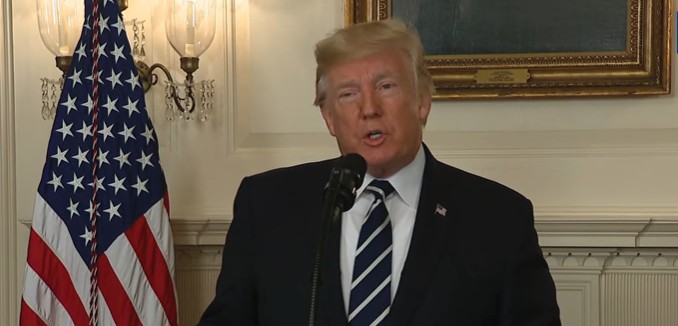President Donald Trump’s national security team has unanimously recommended a plan for the president to decertify the nuclear deal with Iran and ramp up pressure against the Islamic Republic to counter its conventional threats.
“Trump’s team plans to work with Congress and European allies to apply new pressure on the Iranian regime, according to a strategy developed in an Iran policy review led by national security adviser H.R. McMaster,” Politico reported Tuesday. “But the strategy assumes the nuclear deal will remain intact for now.”
News of this plan comes ahead of the October 15 deadline for Trump to announced whether or not he will certify Iran’s compliance with the deal.
The admission last week by International Atomic Energy Agency (IAEA) Director-General Yukiya Amano that he could not verify Iran’s compliance with the terms of Section T of Annex I of the deal, means that “the deal is not fully implemented” by Iran, according to David Albright, president of the Institute for Science and International Security.
The strategy to decertify the deal, but not have Congress re-impose nuclear sanctions against Iran would allow Trump to “demonstrate contempt for the agreement and broadcast a new level of toughness toward the Iranian regime,” without straining diplomatic ties with allies who wish to keep the deal intact.
Not all details of the strategy have been finalized and some could change before the president announces his decision on decertification, possibly as early as next week.
It is expected that as part of its stepped-up pressure on Iran, the administration will designate Iran’s Islamic Revolutionary Guard Corps (IRGC) as a terrorist organization. While the IRGC’s elite Qods Force was designated as such in 2007 and the IRGC has been designated for proliferation activities and humans rights abuses, the entire organization, which answers directly to Supreme Leader Ayatollah Ali Khamenei, has never been so designated before.
In addition to projecting Iran’s power around the world, the IRGC also controls a significant percentage of Iran’s economy, often through front companies.
In a speech before the Council on Foreign Relations on Tuesday, Sen. Tom Cotton (R – Ark.) described a possible approach for how Trump would proceed after decertifying the deal.
Observing that the president previously certified the deal, likely because he was still reviewing his policy options, Cotton declared that “the time for reviewing Iran policy is over.”
“The president should decline to certify, not primarily on grounds related to Iran’s technical compliance, but rather based on the long catalogue of the regime’s crimes and perfidy against the United States, as well as the deal’s inherent weakness,” the senator said. “The deal and the status quo are most certainly not in our ‘vital national-security interests.'”
Cotton also clarified that “this certification occurs under U.S. law-not the deal itself. The decision not to certify doesn’t withdraw us from the deal immediately. Rather, it gives Congress a 60-day window to do quickly what we’ve always had the power to do: re-impose sanctions.”
Decertifying the deal, in Cotton’s words, “would also signal to Congress, to our allies, and to Iran,” that the president “intends to confront the Iranian threat.”
[Photo: The White House / YouTube]




